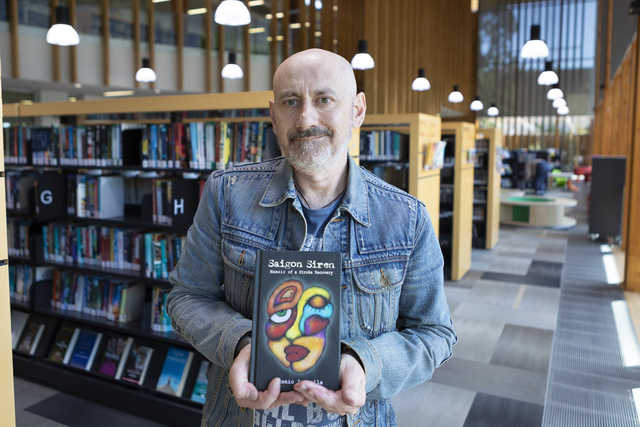By Afraa Kori
When Antonio Iannella had a stroke while on the trip of a lifetime back in 2009, he wasn’t sure he would ever be able to speak again, now the Melton man has published his first book.
Antonio was on a family holiday in Vietnam when his stroke struck. Aged just 38 at the time, he spent time in ICU in Saigon, before he was flown home to Melbourne to begin the long and arduous road to recovery.
“At first, the stroke took a lot from me. It impacted every part of my life. I spent three months doing rehabilitation and had to re-learn how to stand, walk and sit up,” Antonio said.
“I was determined not to let my stroke define my life. I wanted to get back to doing the things I loved and putting my brain to use, and I achieved that by being creative, making music and writing this book.”
In Australia, Antonio spent months relearning motor skills, cognitive functions and daily living activities.
A key part of his recovery process was writing a memoir. Titled ‘Saigon Siren,’ the book has been a 12- year-passion project which has helped Antonio find his voice again.
“The book is a story about hope, determination, family, mental health, creativity and my life after stroke,” he said.
“Writing this book has been crucial to help me grow. I want it to give hope to survivors of stroke to show them anything is possible. I still have disabilities, including fatigue, vision issues.
“But I want to challenge myself and prove that I can still do anything I want. It’s my goal to show others that you can have a great life after stroke.”
Antonio’s journey is also a reminder that some roads you have to take alone, but that’s where the greatest growth happens.
“At the beginning it was overwhelming and heartbreaking. Once hope started kicking where I could achieve things like sitting up, I became more hopeful and determined,” he said.
“I had good support from a lot of people like my friends and family. It was kind of this great feeling of love that you never get before and it was a love of community. So everyone was coming together to support and help me, which was beautiful and humbling. But about a year later when I was out of the hospital system and trying to get my life together, I went through really serious depression. I found out it was pretty common after a stroke because you’re faced with trying to fit in society and how you could function. Even just going to the shops for food and you get online to pay, it’s difficult and confronting. Also I was a guitarist for 20 years and couldn’t play anymore.”
Head of Documentary at London Breeze Film Festival Alexa Banks, a key collaborator and critique partner, said the book is a valuable resource for mental health awareness and understanding.
“Trauma comes with mental health issues and it is so relevant. Antonio is not the only person I know who at a young age suffered from a stroke. It’s much more common than we give credit to. It is not only the reserve of the aged,” she said.
“This story gives me a broader understanding of what it is to have a stroke and a more sensitive understanding of how trauma affects. What I took most on the journey to recovery was how severance and acceptance is the first step to recovering and finding purpose is the finding of oneself again.”
“I would say that when faced with trauma – of any kind that impacts on mental health – there is always a way to tap into who you are inside and find the purpose that gives meaning and can pull you out.
She described the book as a “a rare, visceral immersive experience”.
“Reading Antonio’s work I can feel what it means to be touched by a human hand and what it means to be touched – even if it is being carried into a hydro pool.”
Terry Probert, a longtime friend from Wordsmiths of Melton, said Antonio’s journey resonated deeply with him.
“As a father whose daughter has recently survived a similar situation in a remote area, remembering critiquing Toni’s early chapters put me in the helicopter with her and I could see through his eyes what was happening and the fear Lisa (his daughter) must have faced in those early minutes. I’m glad, though Toni relating his experience gave me assurance for her survival,” he said.
“The stroke has enabled him, not disabled him. Yes, I’m a fan of his writing, his music, his art, but most of all his desire to contribute to his community. I think Toni’s book Saigon Siren should at the very least be in every school and community library across Australia. It will bring awareness to the rarity of his stroke type and make people curious. Informing them to the difficulty in determining the exact kind of stroke a patient may be enduring.”
“Sometimes a memoir or book about a disability can be a challenge to read. However, this memoir is not that. Toni demonstrates that there are down days and hard physical challenges in the road to recovery. You may not get back to the fitness level you were when your stroke/impairment happened, but knowing you can live a full life post stroke is powerful medicine. Toni’s story shows us that. The mind can heal and show survivors another pathway to becoming fully cognisant members of society.”
As a long-time Stroke Foundation advocate, Antonio’s book also details the F.A.S.T. (Face, Arms, Speech and Time) message and the signs to look out for if you suspect your loved one is having a stroke.
Stroke Foundation Chief Executive Officer Dr Lisa Murphy said Antonio is among the 110,000 Victorian survivors of stroke living in the community.
“Antonio has shown great courage and determination in his recovery after his stroke. Considering he had to learn how to walk again, he has gone on to achieve many amazing things,” Dr Murphy said.
“Sadly, Antonio’s story is all too common. Stroke does not discriminate and happens to people of all ages. In fact, 1 in strokes occur in working aged Australians, aged under 65 years old.”
Find out more about Antonio’s book on his website antonioiannella.com.au/







